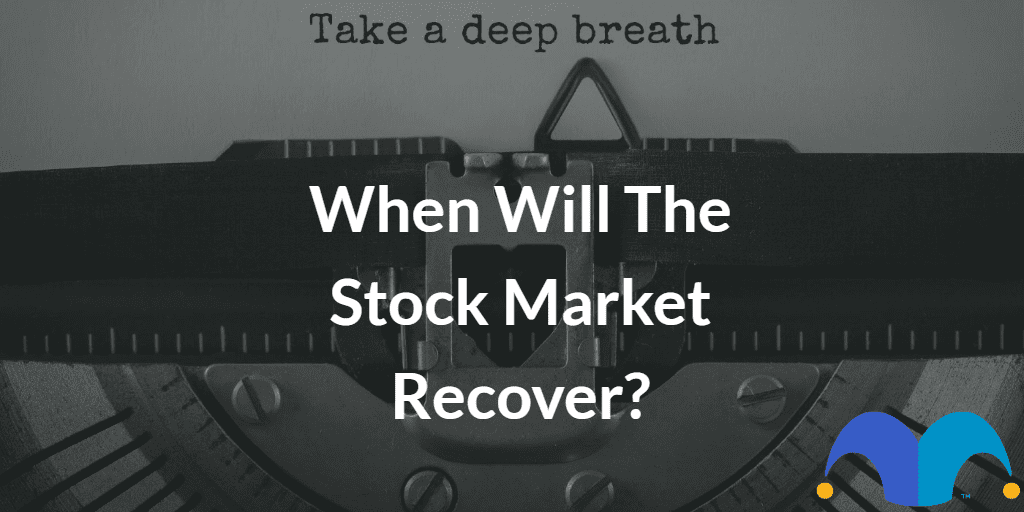2022 has been a fairly painful year for investors worldwide as stock markets plummeted. The FTSE 100 has fared relatively well during this time. Over the first two months of 2022, the index fell by almost 10%. Since then, it’s made a near-full recovery already.
Sadly, the same story can’t be said for the S&P 500 and Nasdaq across the pond. These indexes are down 18.6% and 28.3%, respectively. The growth stocks on these indexes have been hit the hardest. So, it’s hardly surprising that the number one question on everyone’s mind right now is when will the stock market recover?
How long does it take for the market to recover?
“When will the stock market recover?” is a simple question. But sadly, there is no simple answer. Each stock market crash has been unique, with different triggers and degrees of severity that all influence the recovery time.
Today, there is a lot of speculation flying around about when we will reach the bottom of this crash. But the truth is, there is really no way of knowing until after it happens. No one has a crystal ball, after all! And it’s entirely possible that we’ve already seen the bottom, and the stock market recovery has already started.
RELATED: Is the Stock Market Going to Crash?
But what does history tell us?
The analysts at Guggenheim Partners have been tracking recovery times of stock market crashes since 1945 and have produced the following table:
| Decline (%) | Number of Crashes | Average Decline (%) | Average Duration of Crash (Months) | Average Recovery Time (Months) |
| 5-10 | 84 | -7 | 1 | 1 |
| 10-20 | 29 | -14 | 4 | 4 |
| 20-40 | 9 | -28 | 11 | 14 |
| 40+ | 3 | -51 | 23 | 58 |
This table suggests the current stock market crash could last a bit longer, but we might be close to or have already reached the bottom. Is this guaranteed? Of course not. But it is a possibility.
Does the stock market always recover?
Experiencing a stock market crash, especially for the first time, is undeniably a gut-wrenching experience. One day, a stock portfolio looks happy and healthy, and the next, there is red everywhere. And it can seem like the losses are never-ending. But, in reality, the opposite is true.
To quote Motley Fool co-founder David Gardner, “Stocks always go down faster than they go up, but they always go up more than they go down”.
Proof of this can be found when looking at the historical price of any index over the long term. Just look at what’s happened in the last two decades or so. Since 1999, there have been three major stock market crashes (not including the current market meltdown). The Dot Com Bubble in 2000, the Great Recession in 2008, and the Covid Crash in 2020.
Despite each one experiencing major double-digit declines in the space of a couple of months, the stock market has always made a full recovery and then continued to grow, reaching new record heights.
So, does the stock market always recover? Yes. It’s just a matter of when.
[KevelPitch adtype=4578]
What should I do until the market recovers?
Understand your businesses
During a stock market crash, there is a good chance that some of the stocks in your portfolio are simply getting caught in the crossfire of panicking investors. However, there may be a genuine reason why shares are plummeting in some cases.
So, how can you tell? That requires a bit of investigating to discover what’s going on beyond the headlines.
- Does the firm have an enormous pile of debt that will become virtually impossible to manage in a rising interest rate environment?
- Has a competitor just released a new hit product that makes the business obsolete?
- Did the company just lose a major legal battle?
- Is there enough cash or equivalents to meet upcoming bills?
These are just a few examples of the sorts of questions that need to be asked. Every company is unique, so finding the answer can be tricky.
Buy the dip
Suppose a justifiable reason can’t be found as to why a particular stock fell off a cliff, and the long-term strategy hasn’t become compromised. In that case, you might be looking at an amazing buying opportunity.
As crazy as it sounds, buying shares while they are in free-fall can be one of the most lucrative moves an investor can make. And it’s an opportunity that might only come along a handful of times throughout an investment journey.
Stay calm and focus on the long term
There still remains one problem. What if the stock market continues to crash after going on a shopping spree? This is a risk. And while timing the bottom of a crash perfectly can generate the highest returns, this is far easier said than done.
In the short term, the stock market can be highly volatile. And trying to predict movement in a sea of chaos is near-impossible. Fortunately, investors don’t need to have this level of clairvoyance to profit from such situations.
By spreading investments throughout the course of a stock market crash, the probability of ‘finding the bottom’ increases. And while this approach can lead to short-term losses if an investment is made too early, it also reduces the risk of being too late.
Not to mention that these short-term hits could look like nothing more than tiny blips when investing for the long term.
So take a deep breath, stay calm, and focus on the long-term picture. We are in this together, Fools.
[KevelPitch adtype=151]
